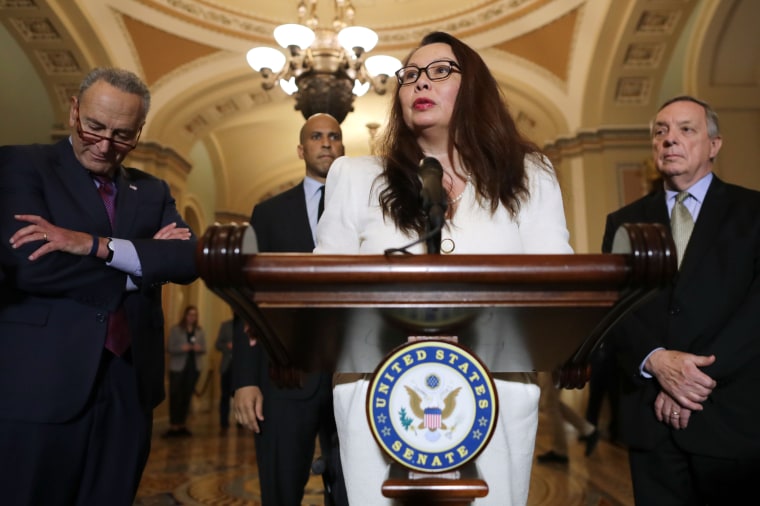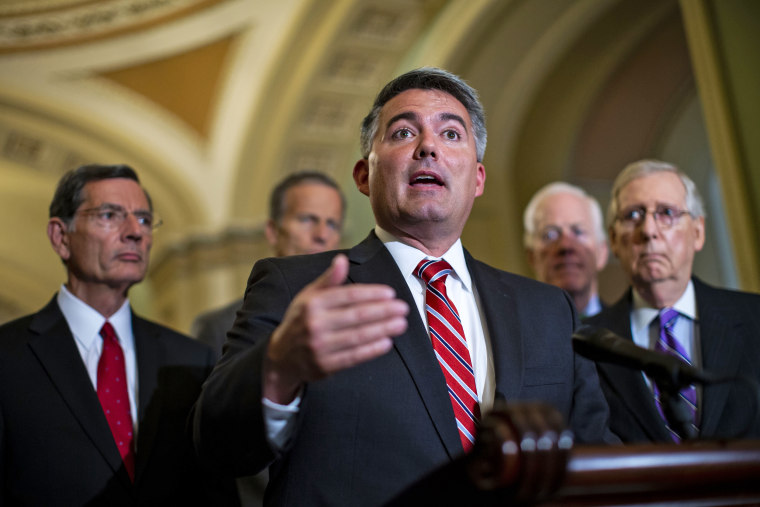Confusion has reigned in Washington in recent weeks after the Department of Veterans Affairs provided a series of inconsistent messages about delayed or incorrect payments to veterans covered by the GI Bill. As the issue gained steam, lawmakers demanded further answers, introduced a related bill and called for an investigation to find out what went wrong and what VA plans to do to fix the problem.
For many, behind this flurry of sternly worded letters and acts of oversight, however, lies an open question: Who should be held accountable for a series of missteps that left student veterans in dire financial circumstances?
There’s also an attempt to discern whether this is a systemic issue at a beleaguered federal agency or mismanagement by a new administration.
“The VA is responsible for executing the handshake that America makes with people in uniform,” said Paul Rieckhoff, the founder and executive director of the Iraq and Afghanistan Veterans of America. “When they screw up, it’s bigger than a bureaucratic issue.”
What went wrong
The “screw up” Rieckhoff referred to surrounds the passage and implementation of the Forever GI Bill, which expanded generous veteran education benefits that were supposed to come into effect on Aug. 1, 2018. Because of a series of computer problems when calculating veterans’ housing allowance, however, VA was late to pay some GI Bill recipients the money they were owed or paid them the wrong amount.
Some of those student veterans faced difficult financial circumstances because they were dependent on the check they received through the GI Bill to pay for housing, books, transportation, food and more.
As a result, VA officials announced in late November that they would delay implementing two sections of the law until Dec. 1, 2019, and pay veterans by a different calculation.
But what soon came to light is that some veterans might be paid less than they were owed under the new law, and a series of inconsistent statements from VA last month that made national headlines compelled some lawmakers to act.
Sens. Cory Gardner, R-Colo., and Doug Jones, D-Ala., introduced a bill last week that would create a commission at the VA responsible for auditing all education claims to ensure that student veterans are paid in full.
“In the last several weeks, we’ve seen hearings and statements from VA officials that show they barely grasp the problem and have no grasp of a solution,” Gardner told NBC News. “In the meantime veterans are worried about paying for food, rent, electricity and school. And that’s unacceptable.”
Inconsistent statements
VA officials told Congress in mid-November that they refused to say when they would implement the GI Bill changes. Less than two weeks later, they took a firm position and announced the changes would be delayed until Dec. 1, 2019.
That began a series of evolving VA positions around housing payments that confounded lawmakers and veterans, as each new statement appeared to conflict with one made previously.
Within hours of the announced delay, VA officials privately told congressional staffers on a briefing call that they did not intend to go back through education claims to discover whether they owed any veterans additional funds.
A little more than 12 hours after NBC News published an article reporting the private discussion, Paul Lawrence, who oversees the Veterans Benefits Administration, claimed before a congressional hearing that the report was misleading, stating “nothing could be further from the truth.”
After members of the House Veterans’ Affairs Committee questioned him further, however, Lawrence admitted that VA was unsure whether it was worth the effort to audit past education claims and ensure that students veterans were paid all the money they were owed. A letter later sent by Democrats on the committee to Veterans Affairs Secretary Robert Wilkie affirmed the call between congressional staffers and VA officials had occurred.
However, hours later, Wilkie released a statement overriding Lawrence and appearing to promise that all student veterans would be fully paid in accordance with the law — eventually.
VA still has not publicly stated how it will implement the change or predicted when it will be able to provide the back pay, leaving many once again suspicious of the agency's ability to deliver on its promises.
"Way too many people are willing to believe the VA," said Rieckhoff. "We don't believe anybody until the check is in the bank. And we shouldn’t. You can’t take a promise from an undersecretary to your landlord. You can’t take a letter from a senator and pay your rent."
Nevertheless, some lawmakers — on both sides of the aisle — have sent letters to push the agenda forward on behalf of veterans.

Sen. Tammy Duckworth, D-Ill., an Iraq War veteran and former assistant secretary for public affairs at VA, sent a letter to Wilkie and three credit reporting agencies last week urging them to act so that no veterans would face long-term financial hardships and credit penalties because of the delayed or incorrect payments.
Duckworth’s letter notes how debt incurred because of the ongoing issue could cause veterans to face numerous financial penalties. Veterans have faced late bill fees, interest on loans and credit cards and bank fees because of the incorrect or delayed payments, putting veterans even further behind financially and potentially impacting their credit scores.
“Bottom line, the veterans should not suffer any negative consequences,” Duckworth told NBC News. “The VA needs to pay them back and pay them back with interests and make sure that credit bureaus don’t take any negative action on their credit reports.”
Who is accountable?
Amid all the back and forth, it remains unclear whether anyone will be held accountable. At the mid-November congressional hearing, VA officials representing the Office of Information Technology and others representing the Veterans Benefits Administration appeared to point fingers at each other.
That has left lawmakers like Gardner frustrated. He said figures at VA appear more adept at playing the blame game than taking responsibility.

“Stop pointing fingers, stop passing the buck and start being accountable and ready for the future,” Gardner told NBC News, adding that it appeared to him that the agency continued to have a “readiness problem.”
Two former officials at VA have told NBC News that in the days and weeks after the Forever GI Bill was signed into law, members of the IT office promised they would be able to implement the system changes by the following April.
Those promises allowed the issue to fly below the radar, they said, but an aging system and a litany of other computer problems forced delays and further troubles.
”It’s a very complicated piece of legislation, but the bottom line is that IT lied and couldn’t pull it off and no one got held accountable,” one official said.
Duckworth noted that the Trump administration waited two years to appoint someone to lead the VA’s IT office, which cycled through three acting leaders in the interim.
“The problem is the Trump administration only just now got the CIO of VA confirmed in the last month. They’ve gone almost two years without a chief information officer,” she said. “That’s unacceptable.”
A secondary issue is the complexity of the changes that the Forever GI Bill called for and the lack of resources allocated to address them. While Congress authorized $30 million to help with system updates, the funding was never appropriated.
“The changes to the GI Bill don’t magically appear because Congress says they have to,” one official said. “There are resources that are needed — both people and money.”
Former Secretary of Veterans Affairs David Schulkin, who left the VA earlier this year, said he was proud to have been secretary when the Forever GI Bill expansion occurred and the opportunities it provided. He declined to speak further on the issue, but noted that implementing a law is never simple.
“Every piece of legislation is a heavy lift to do well,” he said in an email.
Veterans left disappointed
Rieckhoff said that lawmakers should have known this was an issue and pressed VA officials for answers sooner. He said it was particularly discouraging that White House Press Secretary Sarah Sanders and the president have said nothing about the ongoing crisis for some veterans.
“I see everyone screaming that this is an outrage now and that’s great,” Rieckhoff said. “But where were they three months ago and where’s the president now? He personally billed himself as a philanthropist, someone who could fix the VA.”
To Rieckhoff, he’s yet to see any indication that they are any different from previous administrations.
Veteran issues, he said, are apparently only important on Veterans Day, Memorial Day or when there is a big crisis.
“Trump is the dog that caught the car,” Rieckhoff said. “They talked a big game about VA and how they would clean it up and fix it. They just found out that it’s as complicated as it was for everyone else.”
CORRECTION (Dec. 11, 2018, 11:45 a.m.): An earlier version of this article misspelled the first name of a senator from Colorado. He is Cory Gardner, not Corey.



